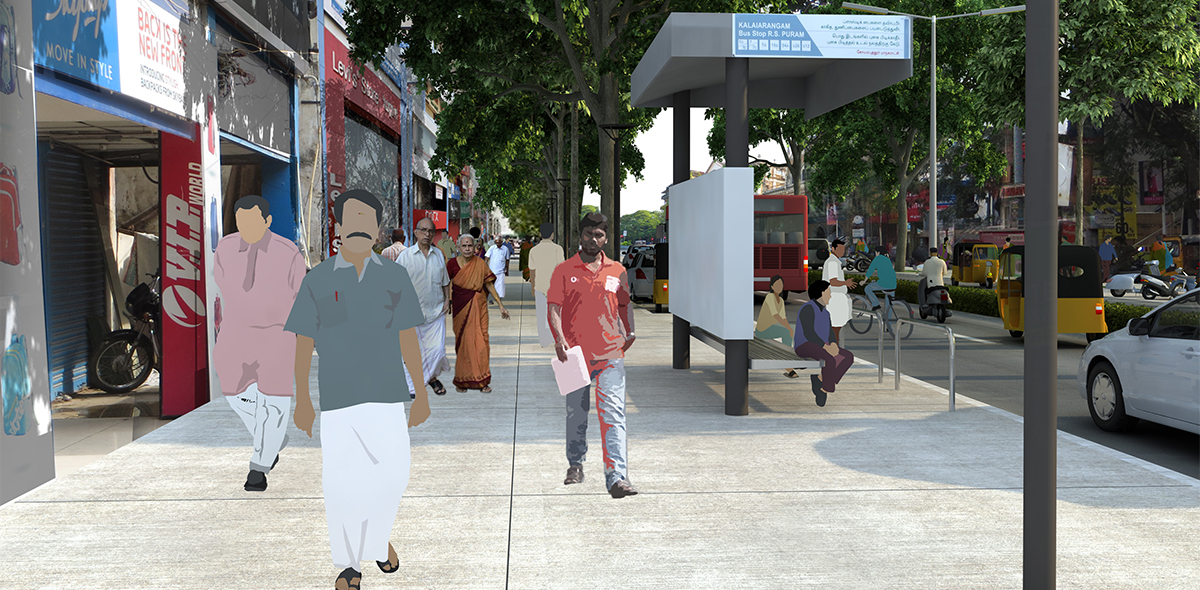“When it’s not a car-free day, where is the space to walk?”, asked a resident of R.S.Puram in 2015, at a stakeholders’ discussion about the Car-Free Sunday event in Coimbatore, prior to its launch. The Happy Streets Car-Free Day initiative has since enhanced awareness among the citizens about the infrastructure needed for cycling and walking – in other words, non-motorised transport (NMT). This level of support and buy-in for NMT from the public encouraged the Corporation to initiate the Model Roads pilot project in Coimbatore in 2015.
For this first phase, 6 roads have been selected by the Coimbatore City Municipal Corporation: DB Road, TV Swamy Road, Sanganoor Road, NSR Road, Masakalipalayam Road and Race Course Road. A total of 13.1 kms is to be revamped with broad pedestrian-friendly pathways, allocated zones for parking and vendors, safer crossings and better provisions for utilities.

Conference on Sustainable Cities Through Transport
In the wake of rapid motorisation a few years ago, the cities of Tamil Nadu realised a need to address mobility challenges. In 2013, the Commissionerate of Municipal Administration (CMA) thus hosted Sustainable Cities through Transport, a planning workshop organised in partnership with the Institute for Transportation and Development Policy (ITDP) and with support from ICLEI–SA South Asia. The objective was to develop sustainable transport plans and create municipal transport budgets for five cities in Tamil Nadu including Coimbatore.
The Coimbatore Corporation engineers attending the workshop concluded that the city should aim to increase its share of public transport, cycling and walking to 60% by 2018. As a step towards achieving this, a network of Complete Streets, including the Model Roads, was proposed. The proposal comprised a target of 49 kms of footpath upgrade,19 kms of street pedestrianisation, 37 kms of greenways and 31 kms of cycle tracks. Furthermore, to ensure the prevention of vehicle encroachment for the success of these NMT projects, 5 zones were identified for better parking management.

The Coimbatore Corporation engineers concluded that the city should aim to increase its share of public transport, cycling and walking to 60% by 2018.
For implementation in the first phase, the Corporation identified 6 streets in its jurisdiction, based on right of way — 12 m or more — and pedestrian demand. CCMC empanelled architects for the first time, with the assistance of ITDP, early in 2016. The 5 firms – Padgro, Design Consortium, VeraCITY, Arth Agam and Yanapada – were assigned the work of redesigning the streets.The architects carried out various surveys and developed conceptual designs, which was later tested on-site through line drawings to check for feasibility.
In order to get work started on the ground, CCMC conducted the first coordination meeting early in August, 2016. This meeting brought together the Corporation engineers, architects, ITDP and partner association RAAC (Residents Awareness Association of Coimbatore). The engineers along with ITDP reviewed the designs presented by the architects. Since then, coordination meetings are being held once every month to ensure the smooth progress of the project.

Break-out group discussing at a coordination meeting.
An important milestone in the execution of the Model Roads Pilot project was the resolution passed by the CCMC at the Council Meeting held later that month. The Corporation sanctioned Rs.5.47 crores to take up D.B and T.V Swamy roads in the first phase of construction. The tenders to start work on these roads are have been floated in November. Implementation of the Model Roads project will soon be rolled out.
Moving forward, the Corporation is looking to host a 3-day exhibition in early December, showcasing visualisations of the proposed designs of the Model Roads. The exhibition aims to inform public regarding the many transport-related initiatives that CCMC is taking for the development of the city. Feedback collected from the citizens during the event will be used to shape the final design of these people-oriented projects. With all these plans in place putting pedestrians and cyclists at the top of the hierarchy, Coimbatore is showing the way for other Indian cities!







